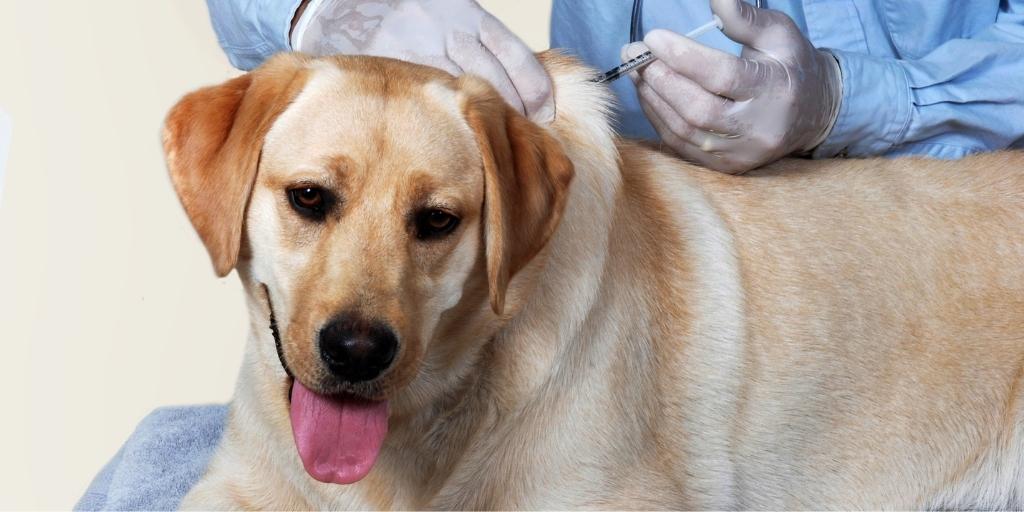There is SO much information on canine vaccination out there. But some of it might be more confusing than informative. Do you think you know everything you need about vaccinating your dog? For your dog to lead a healthy and happy life, protection against disease is essential. Keep reading to find out what the experts have to say on vaccines in dogs:
When should puppies get their first shots / vaccines?
In most cases, first vaccines given in 3 doses with an interval of ONE month between them, starting at 6 to 8 weeks of age.
So, the most common vaccination scheme starts at 6 and 8 weeks of age, with a second dose being given at 12 weeks and the last at 16 weeks.
Generally, these first vaccines will protect your puppy against the most common (and deadly) viruses that affect young dogs – Parvovirus and Distemper.
Is the vaccination schedule always the same for all dogs?
The timing and even the number of booster shots may vary. For example, first vaccination schedule given to a 6wk-old puppy will not be the same as the vaccination schedule for a dog with no previous vaccines or an unknown vaccination record.
Relying on the knowledge and experience of your dog’s veterinarian is key, as vaccination may need to be adapted to your dog’s specific case and lifestyle. Factors such as age, diseases that affect the immune system and individual sensitivities will influence the frequency and type of vaccine the veterinarian recommends for your dog. Although there are international guidelines for canine vaccination, your veterinarian is the only professional equipped with the knowledge to adjust them to your dog’s case.
How do vaccines actually protect against disease?
The protection provided by vaccines is achieved by stimulating antibody production, against a certain infectious agent – viruses, bacteria or others – that may infect dogs, causing disease. If your dog produces enough antibodies after a vaccine (called a protective titer), then these antibodies will fight off the disease. Vaccines are like shields against disease, but you should know that the shield may not become fully activated after just one dose and it doesn’t last a lifetime. That’s why there are booster shots. The protective effect (the antibody titer) of vaccines wears off over time. So booster shots basically reactivate the shield when the protection levels start to fade.
What diseases should my dog be vaccinated against?
Most importantly, dogs should always be protected against deadly or dangerous diseases. Vaccines against these diseases are known as core vaccines. Core vaccines are vaccines against Parvovirus, Distemper, Canine hepatitis and Rabies.
There are other very important vaccines, like Leishmaniasis, Leptospirosis and Kennel Cough, but these are non-core vaccines. Non-core vaccines are not globally recommended. Your veterinarian might recommend for your pet depending on age, lifestyle or location, amongst other factors. Basically, the recommendation of such vaccines depends on the risk.
What are combo vaccines?
5-in-1 or 3-in-1 or combo vaccines are vaccines that stimulate the immune system to create antibodies against several diseases. Combo vaccines are widely used in clinical practice. Thus, they confer protection against more than one disease.
By law, is there a mandatory canine vaccine?
Rabies vaccination is legally mandatory for dogs in most countries. Being a deadly disease with no cure and a zoonosis (transmissible to humans), prevention of Rabies is a priority for many governments.
Why does my vet recommend vaccination against other diseases?
Depending on how much risk your dog has for becoming infected with certain diseases, your veterinarian might
LEISHMANIASIS
Sandflies, are small insects similar to mosquitoes. They transmit the parasite responsible for Leishmaniasis. These flying little vehicles of disease are mostly active in warm seasons, at dusk and sunset.
Preventing Leishmaniasis through vaccination is the best way to protect your dog, since the disease has no cure. Your veterinarian will only recommend this vaccine if you live in a zone where the sandfly and leishmaniasis exists, or if you plan of travelling with your pet to warmer places.
LEPTOSPIROSIS
Leptospirosis is another of those vaccines that can be advised for your dog. Rodents are the main source of transmission. By contact with the urine of an infected rat (or with water/food contaminated by urine), the bacteria infects the new host. Prevention is key, not only because Leptospirosis has high mortality rates in dogs but because it is a zoonosis and may infect human family members.
KENNEL COUGH (KC)
Kennel cough (or Canine Infectious Tracheobronchitis) has several known causative agents (bacteria and viruses). If your dog is usually in contact with many other dogs (e.g. in dog parks, doggie day care or pet hotels) it is wise to vaccinate against KC. Kennel cough is highly contagious, although seldom deadly. And although vaccinated dogs may still catch the disease, it will present in a much less severe form.
There are also other vaccines against other non-core diseases, but the previous three serve as examples: when your vet suggests a vaccine that is not core to your dog’s health plan, this is because the risk of disease is elevated for your dog in particular. That is why there isn’t a “one size fits all” vaccination plan.
Trust in the professionals who studied to learn how to protect your dog. And always take your questions to the veterinarian if you have any doubts on the subject.
Stay up-to-date on your dog’s vaccination scheme with the Petable App. You can set reminders and notifications for when it’s time to schedule your dog’s shots:
Author: Bárbara Isabel Silva

Leave a Comment